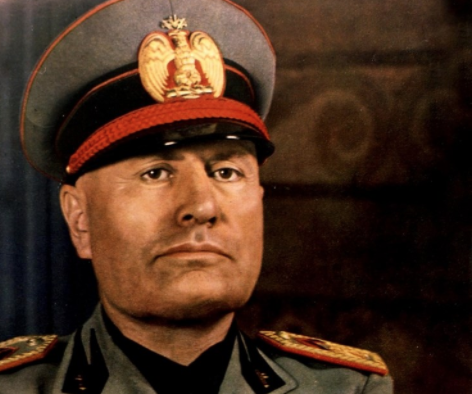No, Fascists Aren’t ‘Far Right’

Benito Mussolini was one of the men that worked on an essay titled “The Doctrine of Fascism.”
March 5, 2018
“All within the state, nothing outside the state, nothing against the state.” This is Italian dictator Benito Mussolini’s definition of fascism. From this definition, it is clear that fascism belongs not to the right wing, but to the left.
Though the roots of fascism are difficult to trace, two major philosophers can be credited with developing the ideology: Benito Mussolini and Giovanni Gentile. Together they worked on an essay titled “The Doctrine of Fascism,” which was first published in 1932. The two wished to develop an ideology in which the communal aspects of the traditional early 20th century family, such as loyalty and brotherhood, were transplanted into national policy.
Gentile regarded this “true democracy” as superior to America’s “liberal democracy.” By his standard, individual liberty was antithetical to the self and “true individuality” of man. On the other hand, “The Doctrine of Fascism” stated that “man is man only by virtue of the spiritual process to which he contributes as a member of the family, the social group, the nation.”
Simply put, the individual does not exist; there are only parts contributing to a larger family or community-like group. The doctrine also says that it is “opposed to all individualistic abstractions.”
Mussolini’s work also shows that he had strong socialist tendencies. In one of his final interviews before his death with Ivanoe Fossani, Mussolini said that “I have been and am a socialist.”
In addition, Mussolini wrote for numerous left wing publications, including The Class Struggle, Avanti! And The People of Italy. He was well-read when it came to socialist literature such as that of Georges Sorel and Friedrich Engels. Mussolini was a member of the Italian Socialist Party until his expulsion in 1914 for supporting Italy’s participation in World War I.
This expulsion prompted Mussolini’s socialist beliefs to morph into fascism. He felt that the war’s outbreak disproved socialism’s theory of class identity. Instead, the common man identified more with his nation, and would fight to the death to defend what he saw as his history. In other words, war appeared to bring out a person’s natural tendency to fight for a greater cause against a warring state rather than what Marx called the “dictatorship of the proletariat”. In a speech on his transformation, Mussolini said that “class can become an integral part of the nation, but one can not eclipse the other.” This shows that fascism is simply the adaptation of socialism to fit the form of national identity rather than that of class.
Unless one is willing to make the assumption that adherence to national identity makes one right-wing, then fascism is not of the right. On the contrary, if nationalist tendencies do make one a member of the right, then socialist dictators such as Pol Pot and Mao Zedong should be listed alongside conservative heros Barry Goldwater and Ronald Reagan.














Jack • Mar 4, 2022 at 9:55 am
This is not opinion its abject fact. Musollini was a far leftist. He described himself as a socialist, a socialist ultra, a communist and as a corporatist at times in his life.
One of the biggest misconceptions which have led to Mussolini being considered a right winger (ignoring the clear Marxist propoganda which is spreading through western academia and MSM), is the incorrect connection between capitalism, corporatism and money (this is actually also due to Marxism, Marx initially made that incorrect correlation).
Capitalism, comes from the Latin Capita, meaning “head” or individual, for example if you wanted to analyse per capita it means per individual, a capital city is a head city or individual city and money capital means individual wealth or head up wealth.
Corporatism is the reverse side of the coin, Corpor is Latin for body. I.e a collective.
So
Capita = head/individual
Corpor = body/collective
Capitalism =individualism
Corporatism = collectivism
Individualism = right wing
Collectivism =left wing
Voilà Musollini and fascism were Marxist.
Hitler was also a Marxist too, not just because of the Fascism connection. There is tonnes of evidence for that connection.